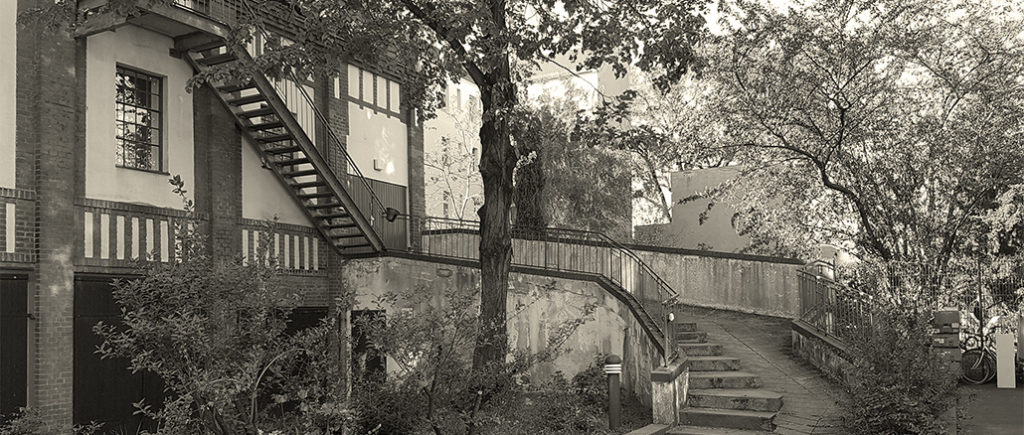
By the time the deportations began, about one third of all Jews had managed to flee out of Germany. In Berlin, the number of Jews went down by more than half, from around 160,000 to approximately 73,000. Once the ban on emigration from Germany came in, the Nazi state deprived Jewish citizens of their last opportunity to leave the country in a regular manner.
Soon after war began in September 1939, legal border crossings were almost impossible. Apart from committing suicide, the only option left for Jews was to flee underground. This meant a life as a so-called “submarine” in illegality to escape deportation to ghettos and extermination camps. Most tried to live as normal a life as possible with fake papers and avoided attracting attention. Others hid in their own or other people’s apartments or even in allotment gardens.
To survive underground, a number of conditions had to be met: As well as good luck, this included strong nerves, the ability to make the right decisions fast under stress and pressure, quick wits, and courage. The city itself offered certain advantages due to its size and the associated anonymity.
Another requirement was non-Jewish Berliners who could bring food to the Jews and organise fake papers as needed.
However, those who did not repeatedly have access to relatively safe hiding places could hardly escape arrest in the long run.
For each person in hiding, up to ten, sometimes considerably more, non-Jewish supporters were needed. Those who helped risked a lot: Conspirators faced prison sentences or temporary admission to concentration camps.
We know little about the helpers. Interest in them only began very late. According to estimates, more than ten thousand people must have helped persecuted Jews to survive.
How frequent such gestures of solidarity were is impossible to say today, but they did happen. Reports like this one from Leo Baeck show that the usual excuse that there was nothing people could do was not true. Nevertheless, the majority of people did nothing.
There were of course also denunciations. In one letter to the Gestapo it says:
The number of denunciations for interacting with Jews increased to such an extent that they disrupted the ordinary business of the authorities.
Showing up in public, even being on the street, could lead to exposure. When Morris Weissmann was looking for new accommodation on 24 November 1943, a woman in Calvinstrasse recognized him. He tried to flee but she shouted after him: “A Jew, a Jew, a spy, arrest him!” Passers-by beat him with fists, sticks and spade handles. The aggressive mob came to a halt on the corner of Alt-Moabit and Thomasiusstrasse. Weissmann was arrested.
But even if it was possible to find a place to stay, this did not mean one could relax. The following report shows the tension under these people lived:
All this was necessary so that curious neighbours who were loyal to the regime would have no clue about their existence.
It became even more complicated when several people were hiding in the same apartment. Esra Feinberg remembers this:
Only a small proportion of Berlin’s Jews were able to save themselves from deportation and murder by going into hiding.
Of the approximately 160,000 Jews who lived in Berlin in 1939, only about 6,500 were counted in 1945. In Tiergarten, over 80 Jewish neighbours managed to hide in about 50 places. It is estimated that of the Jewish Berliners who chose to go underground, some 2,000 experienced liberation after years of illegality. There were also several thousand who were married to non-Jewish spouses, which protected some of them.
The actual number of people in hiding was probably much higher. But many of them were discovered – some by stupid coincidence, but even more by betrayal.
When the official channels found no more victims, the authorities knew how to help themselves with informants, empty promises, and blackmail.
Jews were forced to betray other Jews as so-called “Greifer” (‘grabbers’). In return, the protection of already imprisoned relatives was held out to them as a vital incentive for survival. Of course, these turned out to be empty promises that were not kept. It is hard to imagine what moral dilemmas this Gestapo lies caused.
It is difficult to pass judgment on the actions of the “Greifer”. It is always necessary to consider the whole situation of persecution, threat, and murder of many family members. The perpetrators thus ultimately delegated the decision over life and death to the victims. After National Socialism ended, the Jews who had survived in illegality demanded compensation for their suffering yet endured further humiliation. For example, the Federal Indemnification Act of 1953 distinguished between living conditions that were like prison, which were to be recognised, and a life in the care of well-meaning people. People who were able to escape the Shoa with the help of others were not entitled to compensation. This provision makes it clear that these rules were set up by lawmakers who had already been in office before 1945. It was not until 1959 that the law was changed and this distinction abolished.
« Heilige-Geist-Kirche (Church of the Holy Ghost)
Moabit Goods Station »

